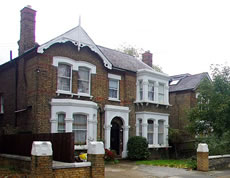Who's to Blame? It's the System, Stupid
Council sacks three employees whilst rent controversy continues
|
The Acton Benefits row escalated yesterday when three council workers, who were sacked after they placed an Afghan family in a £1.2 million property, said they had been made “scapegoats” and were simply following the rules.
Ealing Council lay the blame firmly with government legislation. Meanwhile, a resident living close to the £1.2 million house said the 'clued up' landlord was playing the system and had accused neighbours of being "worse than the third reich."
David Lewis, aged 37, Gemma Calliste, 33, and Salma Khan, formerly Ealing Council employees, told journalists they had been marched from Ealing Town Hall after their housing department team was scrapped.
The sacked employees were all on temporary contracts. They said council bosses were furious after the story of how the taxpayer was footing the £12,000-a-month bill for the home in Acton was leaked.
Ms Calliste said: “We were summoned to the manager's office and he said you had instructions from above and the Rent Deposit Scheme was being scrapped with immediate effect so we were no longer required.
“As we are contractors they said we had to be escorted from the building there and then. We were treated like thieves. I think they were looking for scapegoats because it was embarrassing for the council and when they found out we were temps that was it.”
Mr Lewis said unemployed single mother Toorpakai Saindi, currently living off Horn Lane in a house which has a bedroom for each of her seven children, had been referred to them by the homeless persons unit.
They were then required to find a suitable seven-bedroom property from a private landlord within rent guidelines set by government agency Rent Services under rules introduced in April. Mr Lewis said: “We were just doing our job, but it's a stupid system. I thought £12,000 a month was a lot but it was agreed by Rent Services so it was OK.
“We have basically been sacked with no notice. We were about to get permanent contracts and all of that has been taken away from us. But we haven't done anything wrong. All we've done is apply the rules and find a property for a family in need.”
Mrs Saindi was put in the house with her four sons and three daughters after Ealing council said it did not have one big enough.
But Cllr Will Brooks, Cabinet Member for Housing, laid the blame with government legislation. He said: "Ealing Council welcomes the story published by The Sun and we co-operated fully with the paper's enquiries.
"The sums of money involved in this case will offend people's feelings of 'fair play', especially as so many are having difficulties paying bills at the moment. The story highlights some of the absurdities of the housing and benefit system. Although it is not Ealing Council taxpayers footing the bill it is still public money and the taxpayer who loses out.
"In this specific case, this woman came to the Council with her seven children asking for housing as she was homeless. The council has a legal obligation to help them.
"The government sets national rules about what type of accommodation is appropriate and how much rent can be paid to landlords. The Local Housing Allowance (LHA), set up by the Department for Work and Pensions, told us to house this family in a seven-bedroom property.
"What will surprise and anger people is that these rent levels are published so landlords are fully aware of the maximum levels that can be paid. In cases such as this, where there are very few seven-bedroom properties, landlords will obviously seek the absolute maximum as set down by the government. This clearly puts the council, the government and taxpayers at a significant disadvantage.
"The Council believes that urgent changes are needed to the LHA and in particular for the publication of maximum rent levels to be ended.
This would enable all councils to be able to negotiate more competitive rent agreements without being undermined."
Mr Brooks also said there were “very few seven-bedroom properties” available. This situation resulted in a private landlord - Mr Pandesar - being paid £12,458 a month in housing benefit, more than double the market rate.
However, newspaper researchers took minutes to find similar homes, including one in the same street. The most expensive cost £4,500 a month, £7,500 less than the Saindi family are costing taxpayers now, and has eight bedrooms. Another had period features, a large, well-kept garden with terrace, and gold taps in the main bathroom. It cost £3,400 a month.
When shown details of the home, Mrs Saindi's 20-year-old son Jawad said: “There is no driveway, I need somewhere to park my car.”
The student said the family wanted to live somewhere that was less of a burden to the taxpayer: “We support what people say, but it is not just us involved. There are three parties — us, our landlord and the council. If the council allows it, we will move.”
In total Mrs Saindi, who fled Afghanistan seven years ago, gets £170,000 a year in benefits. She has said she is not to blame. Her son revealed yesterday that Mrs Saindi does not like the house because it is "too big to clean".
October 10, 2008

